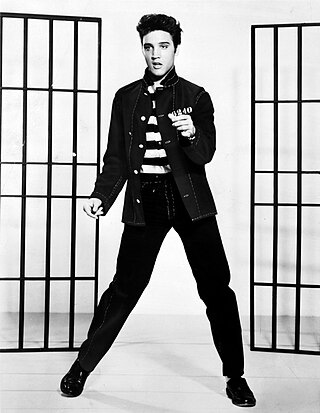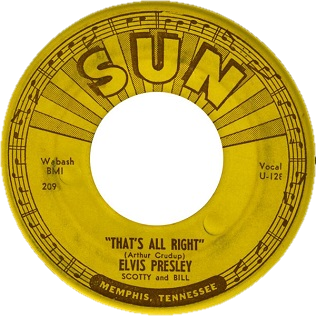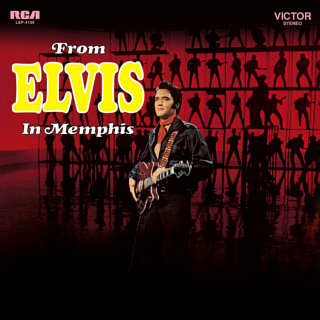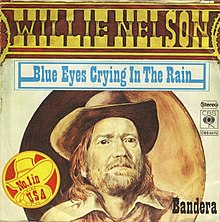
Elvis Aaron Presley, also known mononymously as Elvis, was an American singer and actor. Known as the "King of Rock and Roll", he is regarded as one of the most significant cultural figures of the 20th century. Presley's energized interpretations of songs and sexually provocative performance style, combined with a singularly potent mix of influences across color lines during a transformative era in race relations, brought both great success and initial controversy.

Red Headed Stranger is the eighteenth studio album by American outlaw country singer Willie Nelson, released in 1975. Following the success of his recordings with Atlantic Records, coupled with the negotiating skills of his manager, Neil Reshen, Nelson signed a contract with Columbia Records, the label that gave him total creative control over his works. The concept for the album was inspired by the "Tale of the Red Headed Stranger", a song that Nelson used to play as a disc jockey on his program in Fort Worth, Texas. After signing with Columbia, he decided to record the song, and arranged the details during his return to Austin, Texas, from a trip to Colorado. It was recorded at low cost at Autumn Sound Studios in Garland, Texas. The songs featured sparse arrangements, largely limited to Nelson's guitar, piano, and drums. Nelson presented the finished material to Columbia executives, who were dubious about releasing an album that they at first thought was a demo. However, Nelson had creative control, so no further production was added.
Joe Melson is an American singer and a BMI Award-winning songwriter best known for his collaborations with Roy Orbison, including "Only the Lonely" and "Crying", which are both in the Grammy Hall of Fame and have both been included in Rolling Stone's 500 Greatest Songs of All Time. Melson was inducted into the Nashville Songwriters Hall of Fame in 2018.

Ronnie Lee Milsap is an American country music singer and pianist.

The Sun Sessions is a compilation album by American singer Elvis Presley, issued by RCA Records in 1976. The album contains Presley's earliest commercial recordings, made in Memphis, Tennessee for Sun Records in 1954 and 1955. RCA issued the album in the UK in 1975 under the title The Sun Collection. The album features liner notes by Roy Carr of the New Musical Express. The Sun Sessions features most of the tracks Elvis recorded for Sun Records and produced by Sam Phillips, the head of Sun Studios. The Sun Sessions reached number two on the Billboard Country Albums and number 1 on the Cashbox Country Albums charts.
Lincoln Wayne "Chips" Moman was an American record producer, guitarist, and songwriter. He is known for working in R&B, pop music and country music, operating American Sound Studios and producing hit albums like Elvis Presley's 1969 From Elvis in Memphis and the 1985 debut album for The Highwaymen. Moman won a Grammy Award for co-writing "(Hey Won't You Play) Another Somebody Done Somebody Wrong Song", a 1975 hit for B.J. Thomas.

"Can't Help Falling in Love" is a song recorded by American singer and actor Elvis Presley for his fourth soundtrack album, Blue Hawaii (1961). It was written by Hugo Peretti, Luigi Creatore, and George David Weiss and published by Gladys Music, Inc. The melody is based on "Plaisir d'amour", a popular French love song composed in 1784 by Jean-Paul-Égide Martini. The song was initially written from the perspective of a woman as "Can't Help Falling in Love with Him", which explains the first and third line ending on "in" and "sin" rather than words rhyming with "you".

"That's All Right" is a song written and originally performed by the American blues singer Arthur Crudup and recorded in 1946. It was rereleased in early March 1949 by RCA Victor under the title "That's All Right, Mama", which was issued as RCA's first rhythm and blues record on its new 45 rpm single format.
"Always on My Mind" is a ballad written by Wayne Carson, Johnny Christopher, and Mark James, first recorded by Brenda Lee and first released by Gwen McCrae in March 1972. Lee's version was released three months later in June 1972. The song has been a crossover hit, charting in both the country and western and pop categories. Elvis Presley's recording was the first commercially successful version of the song.

Reggie Grimes Young Jr. was an American musician who was lead guitarist in the American Sound Studio house band, The Memphis Boys, and was a leading session musician.
This is a list of notable events in country music that took place in the year 1954.

From Elvis in Memphis is the ninth studio album by American rock and roll singer Elvis Presley. It was released by RCA Records on June 2, 1969. It was recorded at American Sound Studio in Memphis in January and February 1969 under the direction of producer Chips Moman and backed by its house band, informally known as the Memphis Boys. Following the success of Presley's TV special Elvis and its soundtrack, the album marked Presley's return to non-soundtrack albums after the completion of his film contract with Metro-Goldwyn-Mayer.

"Help Me Make It Through the Night" is a country ballad written and composed by Kris Kristofferson and released on his 1970 album Kristofferson. It was covered later in 1970 by Sammi Smith, on the album Help Me Make It Through the Night. It has been covered since by many other artists from Tammy Wynette and Johnny Cash to Elvis Presley and Joan Baez.
"Mammas Don't Let Your Babies Grow Up to Be Cowboys" is a country music song first recorded by Ed Bruce, written by him and his wife Patsy Bruce. His version of the song appears on his 1976 self-titled album for United Artists Records. In late 1975 and early 1976, Bruce's rendition of the song went to number 15 on the Hot Country Singles charts. This song was featured on Chris LeDoux's album released January 20, 1976, Songbook of the American West.

How Great Thou Art is the eighth studio album by American singer and musician Elvis Presley, released by RCA Victor in February 1967. How Great Thou Art is a gospel album with slow numbers on one side, and fast-paced numbers on the flipside. The album earned Presley a Grammy Award for Best Sacred Performance, while it became a Billboard top 20 pop hit and it appeared on the Top Country Albums chart on the top 10.

From Elvis Presley Boulevard, Memphis, Tennessee is the twenty-third studio album by American singer and musician Elvis Presley, released by RCA Records in May 1976. It became Presley's fourth album to reach #1 on the Billboard country music album sales chart within the last four years.

"Graceland" is the title song of the album Graceland, released in 1986 by Paul Simon. The song features vocals by The Everly Brothers. The lyrics follow the singer's thoughts during a road trip to Graceland after the failure of his marriage. Actress and author Carrie Fisher, Simon's ex-wife, said that the song referred in part to their relationship.
Mark James is an American songwriter who wrote hits for singers B.J. Thomas, Brenda Lee, and Elvis Presley, including Presley's US number one hit single, "Suspicious Minds."
"On the Road Again" is a song written and recorded by American country music singer Willie Nelson.
"Funny How Time Slips Away" is a song written by Willie Nelson and first recorded by country singer Billy Walker. Walker's version was issued as a single by Columbia Records in June 1961 and peaked at number 23 on the Hot C&W Sides chart. The song has been featured in several live action films and television shows, such as in the first episode of the second season of AMC’s Better Call Saul and in the 2020 Netflix drama The Devil All the Time.












